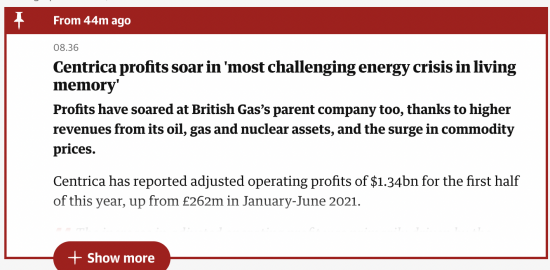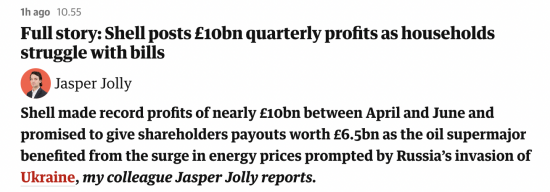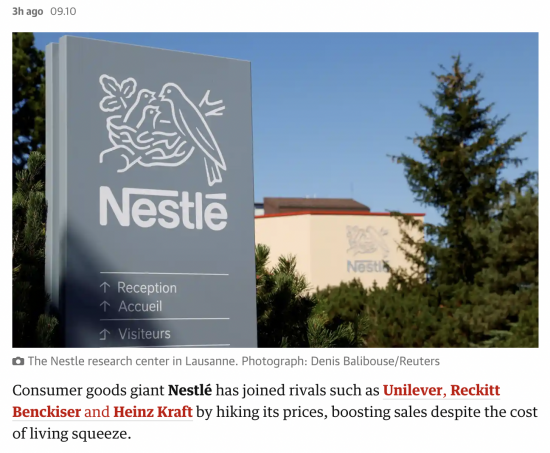These are a selection of Guardian stories from this morning:



What we have are big corporates, operating either as oligopolies or as effective monopolies behind the power of their corporate brands, and therefore able to pass on price increases to consumers without apparent resistance arising (so far), making shed loads of money in full and total explanation of the real cause of the 2022 cost of living crisis.
In 1976 the cost of living crisis was blamed on the power of trade unions.
In 2022 the cost of living crisis is the fault of large corporates screwing consumers into the ground, using the power of their corporate brands and ability to circumnavigate regulations to extract profit for the benefit of a few at extraordinary cost to society as a whole.
I forecast this earlier this year: I said then that it was the state's job to reduce the extent of profiteering to protect ordinary people.
The profiteering has got much worse since then.
The predicament of millions of ordinary people who will this winter literally be unable to pay their bills for energy, water, rent, or their mortgages if they are still to be fed, is unthinkably bad.
I am aware that union are now talking about a general strike in response to this situation. I am not sure that will be enough.
Corporations think the world is now their oyster: I very much doubt this can last.
Thanks for reading this post.
You can share this post on social media of your choice by clicking these icons:
You can subscribe to this blog's daily email here.
And if you would like to support this blog you can, here:



…and it is not just the large energy companies. Profit margins generally are at much higher levels that pre-pandemic levels.
“Profit margins generally are at much higher levels that pre-pandemic levels.”
really what sectors?
Just read the financial pages of the press
Economy-wide (from the ONS)
Its interesting to go back 40 years and look at Johnson and Johnson’s response to the Tylenol poisoning
https://en.wikipedia.org/wiki/Chicago_Tylenol_murders
They withdrew and replaced potentially poisoned products and compensated victims despite doubts about liability.
I don’t see the same sort of decision making today, nobodys deciding to take a cut of corporate profits or hold down the cost of certain product lines
The only organisation doing as well as the energy companies from this spike in gas and oil prices is HM Treasury. Yes, there was the piffling 5p/litre cut in fuel duty but they must be quids in from the enormous increase in the amount of VAT paid.
the big companies , such as Shell, are multinationals. We can have some control over their operations inside the UK but I wonder how far national governments can control their profiteering.
We can control their profiteering by controlling their income by legislating to set their retail prices within the UK.
Serious energy questions include:
– is OFGEM in hiding?
– who has challenged the doubling of electricity/gas standing charges?
David Byrne.
Ofgem is in the producer’s side
This is regulatory capture
Centrica – Profit £1.34bn from £262m a year earlier
Shell – Profit £11.5bn in a qtr.
The windfall tax is useless, while it will drive some future green investment the problem is now. They’ll manipulate the windfall tax figures anyway to reduce the liability.
the fact is for the UK that there isn’t a shortage of product and the cost access it hasn’t changed, we’re just being milked for all we can give.
At some point in the future when the market levels out and the speculators move on they’ll probably come cap in hand to governments for financial tax breaks and handouts to ‘see them through difficult times’.
Typically the tax paying public will pay when the market is good and pay when the market is bad, the odds are always fixed in houses’ favor.
The big question on energy prices is how has France managed to keep their cap at, to all intents and purposes, the pre-crisis level? ‘The Investors don’t like it’ was the UK Business Secretary’s response, showing who this Government see as their masters, but if France can do it, so can the UK.
Huge financial institutions and similar businesses in other sectors are so far separated from ordinary people they seem to forget if ‘the public’ have no money, ultimately, somewhere in their financial eco-system, there will be no income and they can’t make anything. Bleeding dry your customers may seem a great short-term profit generator, but is long-term suicide – quite apart from what desperate people then do. (So far, they have managed to turn the anger against the wrong targets – that cannot work forever).
I might be mistaken but didn’t the ‘temporary, targeted levy’ (the windfall tax) also come with tax reliefs as well to ease the burden for those companies?
Yes
Not just energy…..
NatWest results just released. FT headline is “NatWest boosted by rising interest rates”…..
They are paying a special dividend and the shares are up 8%
There was a discussion on the blog a few days ago about whether higher rates increased bank profits . Whatever the “theory” I think this closes the debate.
Hence my call for an excess profits levy on banks
stop divis until all leaks stopped. limit margins to those of e.g. supermarkets. these are foreign owned monopolies. same goes for gas and electricity. the essentials. not the wants .if they do not like it .FO. this model is a madness
sometimes I thought britain was being run for all of us. Now I learn it’s only run for shareholders. As if I am not a shareholder as a brit And the shareholders are foreign sovereign funds and private equity living in the BVI. Not us